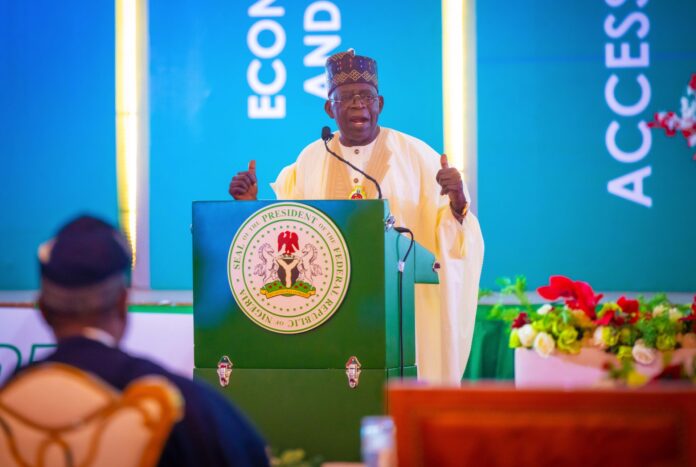The Tinubu Media Support Group (TMSG) has said that the recent report on Nigeria by a foremost global business advisory firm, PricewaterhouseCoopers (PWC), is another proof that Nigeria is on a positive economic trajectory under President Bola Tinubu.
This, according to the group, puts a lie to the doomsday alarm of opposition elements on the state of the economy.
In a statement signed by its Chairman Emeka Nwankpa and Secretary Dapo Okubanjo, TMSG argued that the firm’s Economic Outlook for the first six months of 2024 was detailed enough to show how the reforms have been freeing up funds for the administration’s projects, including its recently announced National Construction and Household Support Programme.
It said: ” What further evidence of the good works of the President Bola Tinubu administration, since assuming office, could be clearer than the report of a global authority like PricewaterhouseCoopers on the ongoing economic reforms in Nigeria at time like this?
“PWC’s H1 2024 report was incidentally released in the middle of efforts by opposition figures to use the global cost of living crisis to de-market Nigeria under the current administration.
“But now, several days after PWC made public its Economic Outlook report, we have not heard a word from those misleading their gullible followers that they could do a better job than our clear-headed President Bola Tinubu
“For the avoidance of doubt, this is what PWC said in its report, ‘The reforms have yielded positive outcomes. FAAC disbursements increased by 91.3% from N976 billion, which was disbursed in May 2023 to N1.87 trillion in April 2024.
The increase was driven by distributable VAT, statutory allocation, and exchange rate difference revenue.
“It also added that, ‘Fitch Ratings revised its outlook on Nigeria’s Long-Term Foreign-Currency Issuer Default Rating (IDR) from Stable to Positive. Oil exports grew by 200.9% to N15.5 trillion in Q1 2024 from N5.15 trillion recorded in Q1 2023.
Non-oil exports also grew by 38.5% to N1.8 trillion in Q1 2024 from N1.3 trillion recorded in Q1 2023. FDI’s grew 114% from $86 million recorded in Q2 2023 to $184 million in Q4 2023. Similarly, FPI’s increased to 190% from $106.9 million in Q2 2023 to $309.8 million in Q4 2023.’
“Only the thoroughly biased will see these numbers and claim that Nigeria is sinking like former Vice President Atiku Abubakar and his co-traveller, Peter Obi, have been saying for weeks to shamelessly advertise their collective cluelessness”
TMSG also agreed with the global business advisory group on the negative impact of reforms on businesses and outlined recent initiatives by the Tinubu administration to cushion the effects.
“Like all reforms, we acknowledge the impact of the twin reforms of fuel subsidy removal and unification of the exchange rates but even the President himself knew this will happen in the short term and has been deliberate in his response.
“Unlike the shock therapy of Argentina President Javier Millei or the massive tax gambit which Kenyan authorities have hurriedly shelved amid public protests, the Tinubu administration has ingeniously put a human face on the reforms to the satisfaction of understanding Nigerian citizens.
“For example, rather than introduce a new electricity tariff that affects all electricity consumers as seen in other countries, the administration ensured that the new tariff affected only the top fifteen percent of electricity users who account for over fifty percent of consumption.
“Again, only recently, President Tinubu rolled out the National Construction and Household Support Programme to cover all geo-political zones in the country.
This move is aside the quantum leap in federal allocation to the subnationals on his watch.
“Under the new programme, all 36 states and the Federal Capital Territory (FCT) will receive a one-off allocation of N10 billion each for the procurement of buses and CNG uplift programme There is also a delivery of N50,000 uplift grant each to 100,000 families per state for three (3) months as well as provisions for labour unions and civil society organizations.
“In addition to all these is the deployment of N155 billion for the purchase and sale of assorted foodstuff to be distributed across the nation.
“Let us not also forget the derivable local labour in the entire gamut of ongoing construction programme featuring multi-trillion road projects such as the ongoing Lagos-Calabar Coastal Highway, the Sokoto-Badagry Highway and the Trans-Saharan Highway, which links Enugu, Abakaliki, Ogoja, Benue, Kogi, Nasarawa and Abuja, are to be prioritized. It is virtually a new lease of life for many Nigerians.
“All these are clear signs of a human face to reforms that are freeing up funds that the federal government ensures that the citizenry feels the positive impact,” the group explained.
But TMSG wants the federal authorities to take urgent steps to ensure that state governments do not play politics with the distribution of CNG buses and food supplies in their respective domains.




